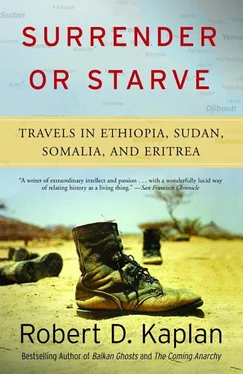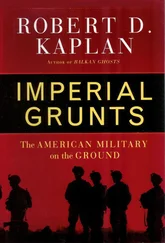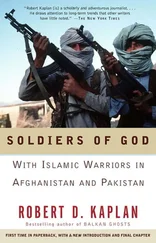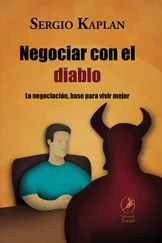As the woman’s reaction indicated, the famine was a crisis of conscience for the West only. The famine certainly wasn’t a crisis for the Eastern bloc. Not a single ruble was collected for Live Aid, of which Dr. Anatoly Gromyko, head of the USSR’s Africa Institute, said he never heard. ( Moskovskii Komsomolets, a widely read Soviet youth publication, described Live Aid as a “tele-cosmic concert” on behalf of peace; the paper never mentioned the word famine .)
But from interviews I conducted in fall 1985 and spring 1986, it became clear to me that the famine did not prick the conscience of many Africans who were not starving. Ahmed el-Tigani, secretary of the Khartoum Doctors’ Union, which was instrumental in overthrowing President Nimeiri, explained that Africans saw suffering all around them and therefore were immune to it. “For us, famine is not grossly abnormal. We have no curiosity. We don’t feel a need to see the relief camps.” “Nobody is thinking about famine or desertification,” said Abdel Gadir Hafiz, chief editor of the local news section of the Khartoum daily El Ayyam (The Days). The shocking scenes of mass starvation witnessed by millions of U.S. citizens in their living rooms were not seen by Africans. When a Sudanese government minister saw a video film of the famine at the home of a Western relief worker, the minister was amazed—he said he had no idea it was that bad. This was in early 1986, a year after the start of the famine emergency in Sudan. Osama Fatouta, a twenty-four-year-old Sudanese who was educated in London, said the only people in Khartoum who cared about the dying peasants were foreigners. Fatouta told me he was motivated by shame to singlehandedly create the Sudanese Volunteer Services Association, a famine relief organization composed of young people like himself, wealthy enough to study abroad, who thus were inspired by Western notions of community service. “People I know think I’m crazy. They can’t understand why I’m doing this. I’ve gotten little support,” Fatouta said. Most Sudanese, or Ethiopians for that matter, couldn’t be bothered. In Breakfast in Hell, relief worker Myles F. Harris likened the African middle class “to the aristocracy in prerevolutionary Russia. They could walk down a street crowded with beggars and see only people on it similar to themselves.”
Fatouta, Harris, and others intimately involved in the relief effort knew an awful truth that many in the United States were afraid to face: that although God may cause drought, famine in Africa is caused by the power relationships among Africans. All the relief assistance in the world cannot change the values by which Sudanese and Ethiopians live. This is why although one million died, nothing changed. The Ethiopian death machine rolled on. Not one truly significant agricultural reform took place. In fact, the same production methods responsible for the 1984 famine have since been expanded through resettlement and villagization. Because the population of more than 42 million is increasing at a faster rate than is agricultural production, the conditions were ripe for an even greater famine catastrophe in the 1990s, according to a 1986 report by USAID. In Sudan, meanwhile, merchants continued to hoard grain, and peasants were forced to borrow money for seeds at exorbitant interest rates. As in Ethiopia, there had been no significant reforms of any kind.
Few relief workers I met in either country were ignorant of these realities. Like Sisyphus, the mythical king of Corinth, they labored in the hot African sun rolling a rock up the hill, knowing in advance that it was going to roll back upon them. “There are no solutions,” said John Richardson, who worked for the United Nations in both Addis Ababa and Khartoum. Even successes were hard to gauge in the statistically unverifiable reality of Africa. Yet millions were saved, if only for the time being. As Martin Fletcher, of the NBC News Tel Aviv bureau, remarked in Addis Ababa, “If you can extend a child’s life for even six months, what’s wrong with that?”
It almost doesn’t matter that in the process of saving millions in Ethiopia, the West may have salvaged Africa’s most chillingly brutal regime, thereby giving it the wherewithal to ruin the lives of even more millions during a long period of time. Graphic images of starving children simply couldn’t be ignored. To ignore the starvation, even if it meant a long-term benefit for the population, would have entailed so harsh and painful a calculation that only the Eastern bloc—if the shoe were on the other foot— would have been capable of it.
Compassion, as the famine clearly demonstrated, was both the U.S. weakness and strength. Imagine the public response if the Reagan administration had—for the sake of toppling the regime—refused to give Ethiopia any emergency aid at all! Given the limitations imposed by our morality, we in the West did about all we could, and what we did was blunted severely by the conditions the Western aid worker faced the moment he or she got off the plane in Africa. Sudan, where Marxism cannot be blamed for the pitiful state of affairs, offers a particularly vivid picture of what relief workers were up against: there can be few experiences more jarring than to emerge from the cocoon of a Swiss Air plane, having just been pampered by elegant stewardesses, red Rhone wine, and Vladimir Ashkenazy on the headphones only to be thrust into the hellhole of Khartoum airport. My fifth arrival, in late 1986, was no easier than my first in 1984. Depression sets in even before the descent, when at 35,000 feet the thin air outside takes on a pasty hue and the plane shudders ever so slightly from the thermal winds and dust of the Sahara; a premonition of the defeating, pie-crust emptiness below. In business class, passengers start gulping their drinks down before ordering one final glass. Given Islamic law, it’s likely to be the last alcohol they’ll see until leaving Sudan.
On the final approach, Khartoum resembles a pattern of rectangles etched in sandpaper, bordered by the White and Blue Niles, which are impressively wide from the air, but do not offer any surcease from the environment once the traveler has landed. The Sudanese capital, designed by the British in the shape of the Union Jack, turns its back on the two rivers. Stepping outside the air-conditioned Swiss Air cabin, the dry, suffocating heat of Khartoum grabs the traveler’s lungs in a vise. Even at night, sunglasses are often necessary due to the dust.
On my last visit, prices of food and other basic commodities were up 50 percent from the year before. There were shortages of everything. Water and electricity cuts were more frequent. Making a local telephone call was harder than ever. The drainage system had become so bad that after a five-minute downpour many of the streets were impassable. Khartoum literally looked mean. “All the drought did was expose just how bad the system always was here,” said a Western diplomat.
Because the Western relief community’s worst enemy was the Sudanese government, aid workers put up with the material hardships of the Acropole, where most of them stayed, in order to avail themselves of the services of the hotel’s Greek managers, who dealt with Sudanese officialdom better than any Western embassy staff could. It may be an irony that while hundreds of millions of dollars of emergency assistance poured into Sudan, the only wedge between partial success and a complete breakdown of the relief effort was a trio of Greek brothers from the island of Kefalonia in the Ionian Sea, whose father had come to Khartoum in the wake of British rule. As journalist Edward Girardet aptly put it in The Christian Science Monitor (July 8, 1985), George, Athanasios, and Gerassimos Pagoulatos and their wives ran a fifty-room hotel, arranged visa extensions and interal travel permits, helped clear aid consignments through customs at Port Sudan, dispatched hand-carried documents throughout Europe, and otherwise ran errands for the relief effort all “with the courtesy and aplomb” of captains “of a luxury liner.” Had the Pagoulatos family packed their bags and gone back to Greece in the mid 1980s as they originally had intended, then the Western relief effort simply might have collapsed. Few aid workers were capable of maneuvering through the corrupt and inefficient Sudanese bureaucratic treadmill by themselves. Many required the Pagoulatos brothers to hold their hands.
Читать дальше












